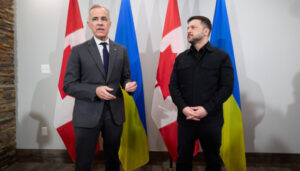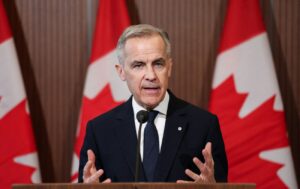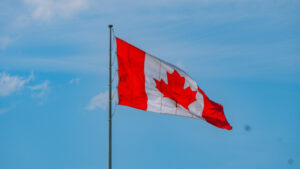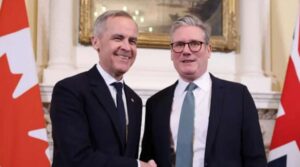
Canadian Prime Minister Mark Carney announced additional economic assistance to Ukraine in the amount of 2.5 billion Canadian dollars, which will help unblock funding from the IMF, the World Bank, and the European Bank for Reconstruction and Development.
“Today we are announcing additional economic assistance to Ukraine. Economic assistance in the amount of $2.5 billion. This will help unlock funding from the IMF, the World Bank, and the European Bank for Reconstruction and Development to start this recovery process,” Carney said at the beginning of his meeting with Ukrainian President Volodymyr Zelensky.
In turn, Zelensky thanked Carney for his help and stressed the need to stop the war.
“And for this, we need two things: pressure on Russia and sufficiently strong support for Ukraine,” the president said.
He said he plans to discuss strengthening air defense with Carney.
“In recent weeks, we have made good progress in diplomacy, but we cannot live under the illusion that this allows us to have less air defense. It doesn’t work with Russia,” Zelenskyy said.

Canada has recognized the State of Palestine and offered to help build a peaceful future with Israel, according to CBC.
Canada officially recognizes the State of Palestine and is doing so alongside international partners to keep the two-state solution alive, according to a statement released Sunday morning by Prime Minister Mark Carney’s office.
As of September 2025, approximately 147 of the 193 UN member states have officially recognized Palestine as a state.

Canada’s economy contracted by 1.6% year-on-year in the second quarter, according to the country’s statistics agency. Analysts polled by Trading Economics had expected a more moderate decline of 0.6%. Compared to the previous quarter, Canadian GDP fell by 0.4%.
According to revised data, in the first quarter, the Canadian economy fell by 2% year-on-year but rose by 0.5% quarter-on-quarter. Canadian exports fell by 7.5% in April-June, while imports fell by 1.3%.
Meanwhile, consumer spending rose by 1.1% and government spending by 1.8%.
Earlier, the Experts Club information and analytical center made a video analysis of the prospects for the Ukrainian and global economies. For more details, see the video — https://youtu.be/kQsH3lUvMKo?si=F4IOLdLuVbYmEh5P

Canadian Prime Minister Mark Trudeau announced on Friday that the Canadian authorities are waiving a number of tariffs imposed in response to US tariffs on some US imports, according to The Globe and Mail.
“In accordance with our commitments under the United States-Mexico-Canada Agreement (USMCA), I am announcing today that the Canadian government will take measures similar to those taken earlier by the US and will remove tariffs on all US goods covered by the agreement,” the prime minister said.
However, Carnie clarified that Canada will maintain tariffs on US imports of steel, aluminum, and automobiles, and Ottawa will work intensively with Washington on this issue. Carney noted that following his conversation with US President Donald Trump this week, the two sides will engage in more active discussions on “challenges in strategic sectors” and on increasing cooperation in trade, investment, and security.
Carney also believes that Canada is making progress in trade negotiations with the US. “Canada currently has the best trade agreement with the US, and although it is different from what it was before, it is still better than any other country’s,” the prime minister said.
On August 1, Trump signed an executive order raising tariffs on Canada from 25% to 35%. The statement emphasized that goods covered by the preferential tariff regime under the USMCA remain exempt from the new tariffs.
In turn, The Globe and Mail reminds us that Ottawa is seeking an agreement that would reduce or eliminate tariffs on a number of Canadian goods. In July, Carnie acknowledged that Canada would probably not be able to convince Trump to cancel all tariffs.
At the same time, Canada implemented three rounds of retaliatory measures against the US. In the first round, it imposed 25% tariffs on US products worth $30 billion, including motorcycles and orange juice. The second round included 25% tariffs on another $30 billion worth of products, including metal products and consumer goods. The third round included 25% tariffs on cars, except for companies that have production facilities in Canada.
However, the publication notes that Canada subsequently softened the impact of the tariffs by approving certain exemptions, including for US-produced raw materials and components used in Canadian manufacturing.

The Chinese authorities will impose a temporary duty of 75.8% on imports of canola seeds (a type of rapeseed) from Canada starting August 14, according to the Xinhua news agency.
This decision was made following an anti-dumping investigation launched in September 2024.
The Ministry of Commerce preliminarily concluded that rapeseed imports from Canada were dumped, that the domestic rapeseed industry suffered material damage, and that there is a causal link between dumping and actual damage.
In this regard, it was decided to introduce temporary anti-dumping measures in the form of safeguard payments.
Quotations for November canola futures on the ICE exchange fell by more than 4% to $650.3 per tonne after the announcement of import duties, according to Reuters.
China is the world’s largest importer of canola and Canada’s main buyer. In 2024, Canada supplied canola worth about $3.6 billion to China.

British Prime Minister Keir Starmer spoke by phone with Canadian Prime Minister Mark Carney on Monday, during which both sides reaffirmed their unwavering support for Ukraine and the need to end Russian aggression.
“The Prime Minister spoke to the Prime Minister of Canada Mark Carney this afternoon. They discussed their unwavering support for Ukraine and ongoing work to stop the killing and end Russia’s war of aggression. Both leaders underscored that Ukraine’s future must be one of freedom, sovereignty, and self-determination,” says a message published on the official website of the UK government.
They also praised international efforts led by US President Donald Trump to bring peace: “They welcomed continued international efforts, led by President Trump, to bring peace and agreed that this must be built with Ukraine – not imposed upon it.”
Both leaders agreed they would continue to work closely with President Trump and President Zelenskyy over the coming days.